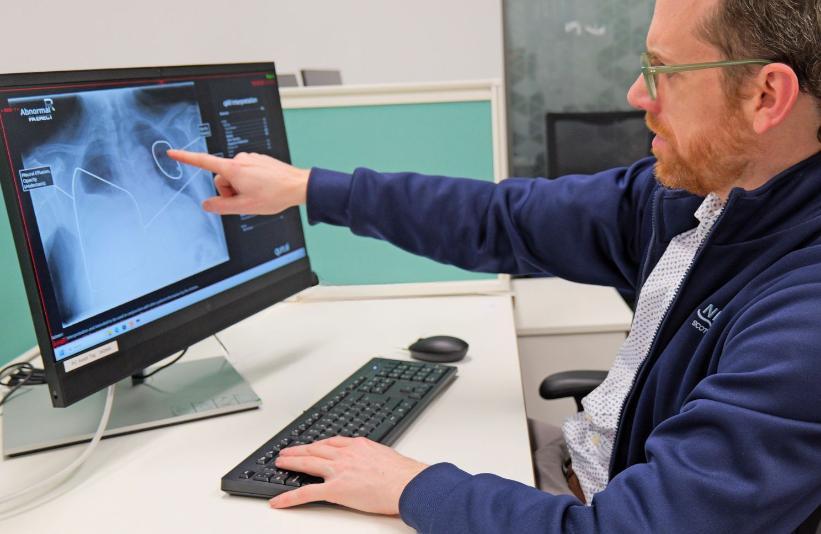The RADICAL Study
AI Chest X-ray Detection of Lung Cancer
The RADICAL study aimed to evaluate the impact of Qure.ai’s qXR AI software in enhancing early lung cancer diagnosis. The AI solution can identify 25 different features and was used to detect signs of cancer.
The Living Laboratory-enabled Digital Health Validation Lab led on the design and delivery of the study to help integrate the software into real-world clinical workflow.
The Challenge:
- High Mortality: Lung cancer is Scotland’s leading cause of cancer death, with ~5,500 new cases annually.
- Late Presentation: 40–50% of patients present at Stage 4, where five-year survival is < 5%.
- Survival Disparity: This contrasts a 55% five-year survival rate for Stage 1 and 35% for Stage 2.
The Aim:
- Clinical Effectiveness: Determine qXR’s ability to triage “Urgent Suspicion of Cancer” cases on chest X‑ray.
- Workflow Integration: Assess the clinical effectiveness of qXR to prioritise patients suspected with lung cancer on x-ray for follow-up CT.
- Evidence Generation: Generate real-world evidence demonstrating clinical effectiveness through qualitative research, health economics analysis and technical evaluation.
RADICAL’s Impact and Future:
The RADICAL study has laid a strong foundation for the future of AI in lung cancer diagnosis, with several key outcomes:
- Proven Feasibility: The study successfully demonstrated that AI can be technically integrated into real-world NHS workflows, enabling automated triage of chest X-rays.
- Valuable Data Creation: A large, clinically validated dataset of chest X-rays was developed with ground-truthed images.
- Implementation Learnings: Deploying the software across multiple NHS sites offered practical insights into how best to scale and optimise AI implementation within diverse clinical settings.
- Cross-Sector Collaboration: The project fostered a ‘Triple-Helix’ partnership model, strengthening collaboration between academia, healthcare, and industry.
- Academic Dissemination: Early findings were published in a high-impact, peer-reviewed journal (BMJ Open, Duncan SF et al.), contributing to the growing evidence base for AI in medical imaging.
- Evidence for Adoption: Interim and final study reports will inform the early value case for the adoption of AI to prioritise reporting of lung cancer.

Achievements at a Glance
- 87,000 chest x-rays evaluated
- 24-month study:
12-month data collection + 12-month follow-up - Integration in 9 hospitals across Glasgow
- 6 Publications in high impact journals:
1 published; 1 in press; 4 in writing - Mixed Methods: 4 distinct research methodologies
- 7 oral and 2 poster presentations at scientific conferences
Building Clinical Innovation Capacity
The RADICAL study has strengthened clinical innovation capacity by embedding clinician Dr Sean Duncan at the heart of AI-driven diagnostics research.

Spotlight on Dr Sean Duncan
As part of the Clinical Innovation Fellowship programme, Dr Sean Duncan played a central role in the RADICAL study - directly contributing to the hands-on evaluation and integration of AI diagnostic technologies.
This experience allowed him to develop critical skills to bridge clinical practice and health technology innovation, enabling him to support the adoption of cutting-edge diagnostics in healthcare while also advancing his career as a clinician.
Sean’s Professional Growth Through RADICAL
- Career Progression: Secured a Clinical Research Fellow position and commenced an MD at the University of Glasgow, building on experience gained through the RADICAL project.
- Skills Development: Gained expertise in health technology assessment, research methodology, academic writing, trial design, and understanding the healthtech ecosystem.
- Business & Innovation Exposure: Engaged with start-ups and SMEs to enhance skills in business engagement and collaborative innovation.
- Publications & Presentations: Led authorship of the RADICAL protocol paper published in BMJ Open and presented project outcomes at key conferences including HIMSS, UKIO, and SCIN.
- Clinical Practice Enhancement: Continued clinical oncology work two days per week, applying new insights from AI and technology-driven research to clinical decision-making.
- Key Career Highlights: Presented at the HIMSS International Conference, developed new academic and statistical skills, and expanded professional network within the healthtech innovation community.




